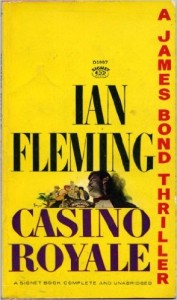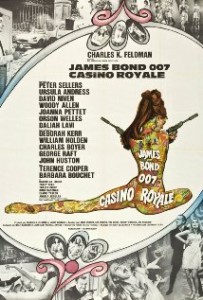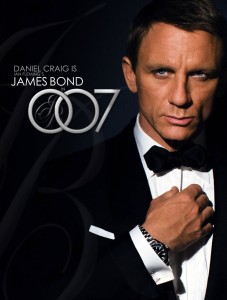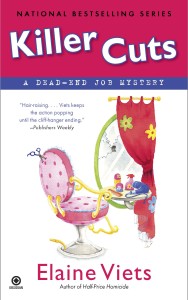By Elaine Viets
 Does your mind wander when you read the hot new thriller? Does that blockbuster mystery sag worse than a flophouse couch?
Does your mind wander when you read the hot new thriller? Does that blockbuster mystery sag worse than a flophouse couch?
Yep, I’ve been running into lots of those: Highly touted bestsellers that make excellent doorstops.
This isn’t about how to fix the sagging middle in your novels. It’s a question about what causes them:
Are modern mysteries too long? Are we forced to produce bloated books?
Most commercial mysteries are 75,000 words or so. The average mystery weighs in at about 325 pages. Many are twice that size.
 But thrillers and mysteries didn’t used to be so big. Once they were as slender as that deadly dame in black. Many Golden Age mysteries were 150 to 200 pages LESS than today’s mysteries.
But thrillers and mysteries didn’t used to be so big. Once they were as slender as that deadly dame in black. Many Golden Age mysteries were 150 to 200 pages LESS than today’s mysteries.
Raymond Chandler’s The High Window was a scrawny 206 pages when it was published by Pocket Books in 1945. Curt Cannon’s I Like ’Em Tough (“Me?” he says, “I’m a down-and-out private eye with nothing to lose”) delivered 143 action-packed pages a princely 25 cents in 1958. Ian Fleming’s Casino Royale was 144 pages in 1953.
Makes you wonder if Fleming’s spy classic could be published today.
 Or would an editor tell him, “Nice story, Ian, but you need to flesh it out a bit. Maybe add another subplot. Or get more of Vesper’s life before she met Bond to justify her actions. And we know almost nothing about Bond’s childhood. Clearly he’s got some daddy issues with M.”
Or would an editor tell him, “Nice story, Ian, but you need to flesh it out a bit. Maybe add another subplot. Or get more of Vesper’s life before she met Bond to justify her actions. And we know almost nothing about Bond’s childhood. Clearly he’s got some daddy issues with M.”
Personally, I like the Bond novels better than the movies. Ian Fleming’s Bond in the original novels is more sensitive and less cartoonish than the man in the movies – and I’ve seen them all. For the record, I like Daniel Craig best as Bond, even better than Sean Connery.
 By the way, if you haven’t read the original Bond novels, you’re missing some elegant writing.
By the way, if you haven’t read the original Bond novels, you’re missing some elegant writing.
Here’s the opening to Casino Royale: “The scent and smoke and sweat of a casino are nauseating at three in the morning. Then the soul-erosion produced by high gambling – a compost of greed and fear and nervous tension – become unbearable, and the senses awake and revolt from it.
“James Bond suddenly knew that he was tired.”
And so the adventure starts and “hums with tension,” according to Time magazine.
The plot is clean and unburdened by armchair psychology. The ending is swift, free of the current trends for corkscrew plotting.
As the end of the contemporary overcomplicated doorstop nears, I find myself saying, “Yes, he did it! I knew it was the American tourist. No, wait, it was the Russian! No, not the Russian, the undercover CIA agent who betrayed his country. Wrong again! It was his gay lover, who wanted revenge.”
When the book finally ends, I’m so exhausted, I don’t much care.
Hardcovers are $25 to $30 now. Maybe we’d have more readers if we wrote smaller books.
Maybe we’re breaking that important writing rule: Less is more.
 Win KILLER CUTS, Dead-End Job No. 8, set at a posh salon where a color and cut are $300. Click Contests at www.elaineviets.com
Win KILLER CUTS, Dead-End Job No. 8, set at a posh salon where a color and cut are $300. Click Contests at www.elaineviets.com

Great post, Elaine…I know a number of readers who bemoan the long length of books these days. I have read several recently where the directive to “grow the book” was obvious. Thanks for bringing this up.
One thing… I’m wondering how you obtained that photo of me during my last physical. Just curious.
That was your BEFORE photo, Joe. Now that you’ve slimmed down, no one recognizes the old you.
I’m one of those authors who was told to grow a book — by 20,000 words. I’m lucky I could add a whole new subplot and the novel got good reviews.
Ding, ding, ding! We have a winner! I think your post is spot-on. I personally refuse to read a piece of fiction which looks like something a barber would put on his chair to boost up a child. Especially when I could read three detective novels from the Golden Age instead.
I’ve read only one Bond continuation, Jeffery Deaver’s, and I was stunned at how bloated and repetitive it was in comparison to Fleming’s original novels. Deaver kept using twists every 30 pages or so, and would revisit scenes he’d just finished to reincorporate them with the twist. Which is fine once or twice, but dozens of times throughout the book? It got boring.
Speaking of Bond actors, I still say that Timothy Dalton, apparently an Ian Fleming fan, *was* the James Bond from the books.
Another anti-bloat vote. Now, if we could just convince editors. You’re right about those white whales. Dalton was historically unlucky — the movie world wasn’t ready for a more troubled Bond. He was ahead of his time.
Yes for Craig, no for bloat. Thanks, Joe.
Elaine, I also read every Fleming novel and loved them all. Not so much with the movies. I do agree that Daniel Craig IS James Bond.
As Elaine notes, there are guidelines for genre fiction (an easy Google) that traditional publishers write into their contracts. Mysteries tend to clock in around 80-90K with cozies a little less. Thrillers go longer and sci-fi/fantasy even higher. Game of Thrones was 298,000 and then Martin bloated up to 424,000. The Harry Potter books ranged from 76,900 for the first one up to 257,000 for “Phoenix”. Which tells me that once your foot is in the door and your foot is big enough, you can turn in as many words as you want.
Genre novels used to be shorter, but today, publishers seem to buy into the idea that if a book is too thin, readers think they are getting less value for their bucks. I’ve heard agents say this on panels. But if the manuscript runs too long, it becomes a question of economics because it costs more to to print and distribute fatter books. Figures from Money magazine a while back: On a list price of $27.95 for a John Grisham hardcover, around $3 is spend on printing alone, with another $2.80 to distributors. (for the record, Grisham gets around $4 royalty.) So the word count of a manuscript is important to publishers’ bottom line. They can play with margins and type size but only to a point. But with eBooks, this paradigm shifts because there is no printing/distribution costs.
If you self-publish, you have to factor in your word count because it can affect the pricing of your paper books. When Kelly and I packaged our back list titles, we did some judicious editing and then played around with formatting for a long time (like eliminating page breaks between chapters to lower the page count) before we found a formula that allowed us to sell the paper books at what we thought was a good value. In essence, we did what every traditional publisher does with a manuscript: keep the word count low enough to make the product look good at a fair price.
Thanks for the hard financial details, Kris. Readers are often surprised by how little writers actually get out of those big book prices. Plus, Mr. Grisham’s agent will take 15 to 20% of that $4.
And don’t forget that the price goes down when booksellers add discounts, which can go up to 50%. Not that we should feel sorry for Mr. Grisham. 🙂
.
I agree with the anti-bloat sentiment. I feel like I really have to work myself up to start a fat book these days. Life is too busy and by the time I’m able to pause to read it’s at bedtime. A supersized book takes way too long to read now.
If only more publishers felt the way you do.
It’s difficult to describe a 150,000 word thriller as “taut”. Suspense can only be sustained so long. The audience needs the payoff.
Anybody notice movies have become longer, too? With the same problems?
Daniel Craig as James Bond? Yum. There’s a man who’s taut in all the right ways, whether or not the movie is ;-).
Oh, yeah, movies are getting much longer. But after so many shootings, I’m watching them at home. Who wants to get shot on a relaxing night out?
As for Daniel Craig, you are a person of taste, Cat Friend.
I think you’ve nailed it. Most novels I’ve read could probably benefit by a reduction of a third or more. Of course, then those $30 prices wouldn’t fly so easily, would they?
But wouldn’t readers buy two $15 books instead of one $30 novel? An addict like me would.
Hullo, I must say that I personally prefer having my books quite thick. My brother Boffin likes them even thicker. Because once it has been readed, it’s a lot more stable to reach into the high cabinets when you strap when you strap a single 4-inch thick Game of Thrones onto the bottom of your shoes than if you strap on four 1-inch thick Remo Williams Destroyer novels. When you’re a sub-4 foot tall Leprechaun in a big person’s house stability matters.
But if you had smaller books, Mr. L, you could tailor the height you needed much easier.
I have and re-read all of the original Bonds. And let’s not forget, two of those books are collections of short stories, maybe 20 pages per story.
Part of the problem is story arc and back story. Bond must “grow” in the book. Um, no. Mr. Holmes appeared in 50 plus stories and all of them are get a case, find the clues, solve the case. People have been loving them for 100 years.
Of the post Fleming books I liked the Young James Bond and the J. Deaver books. Sorry Mr. Gardner, yours were pretty bad. Benson’s Bond books were pretty good.
You’ve nailed it, Alan. We are locked into the cliche of the story arc as if it’s holy writ. It’s simply the current fashion.
When I was a teen and needed reading material (because I wouldn’t get to go back to the library for a whole ‘nother week), I chose big books like ADVISE AND CONSENT. But Drury’s books (though they could run long and be dreary–not THAT one, but later books in the series) were not bloated with stuff that you skipped. I think the major influence is that self-published books are not edited and they’ve been vetted by various critique groups–which leads to you putting in repetitive stuff because the crit group doesn’t remember what you wrote in previous chapters. They read that stuff a few months ago. Crit groups go through chapter by chapter, and it takes over a year to read through and comment on most books at that speed. So you find that you’re being told to put in a reminder about this or that–which leads to the probs you speak of. When books still had EDITORS, they would say, “Tighten! Cut this. Condense that. We don’t need a recap here.” That’s not possible today with today’s publishing avalanche and time constraints.
My books may be long, but I don’t think they are bloated. I have a couple of very picky readers who catch me if I go on too long. But my books DO have introspection and a bit of reflection here and there, so they’re not as tight as Fleming’s were. (I’m talking about the Denise Weeks mysteries as well as the Shalanna Collins fantasy/YA series.) I think a book shouldn’t be a screenplay, and we should get to hear some philosophy from our main characters to prove they’re worthy of us spending so much time with the book.
Couldn’t agree more. There’s also the “name above the title” syndrome. We all need editors, but when the writer becomes so well known they put his name above the title, it’s as if they become afraid to edit him and the books become bloated and almost unreadable. (Looking at you, Tom Clancy.) Proud to say I just finished the final rewrites and edits before self-pubbing my YA adventure novel next month and I’ve managed to trim another 3,000 words. I recently came across a draft from three years ago and it was 15,000 words longer than the current, final version. And the book is much better for it. No one cares about the condition of scullery maids in the 1700s. Get to the pirates!